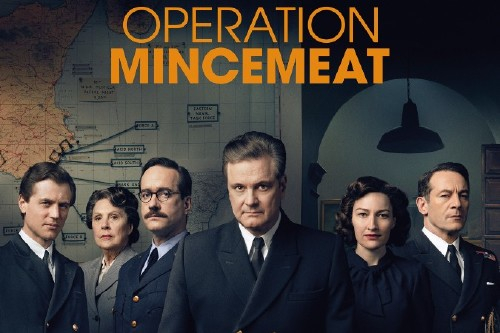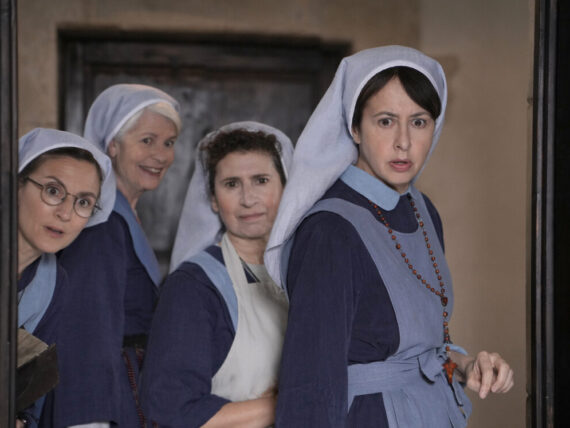Reviewed by Nigel Watson
In 1943 Operation Mincemeat was instigated to convince the Nazis that the Allies were planning to invade Greece rather than their intended target of Sicily.
Ewen Montague, formerly a barrister in civilian life, played by Colin Firth, persuades the sceptical high command that the plan could potentially save thousands of lives. He is aided by the straight-laced Charles Cholmondeley (David Macfadyen) and Jean Leslie (Kelly Macdonald) who agrees to let them use a photograph of herself for their project on the condition that she can join the team.
The plan is to plant fake documents on a corpse dressed as an officer and launch it by submarine towards the coast of Spain. It is hoped it will be found and the fake information will be passed through the German spy network and end up on the desk of Hitler.
There is much dark and grotesque humour in their attempts to find a corpse. Even in wartime it is hard to obtain one with no relatives, the right physical attributes and can convincingly be provided with an invented life story that will fool the Nazis.
Once they find their corpse and name it Captain William Martin, Ewan and Jean concoct a life story for him that becomes a metaphor for their own feelings and desires. It also reflects the fact that fiction is a powerful weapon of war that has consequences in the real world.
As manufacturers of a fiction that requires the production of realistic personal and official documents to fit their story, it is not surprising that their department seems to be full of people writing fiction, including someone called Ian Fleming.
This is no James Bond story, although it does come close to that when the corpse is finally fished out of the cruel sea. The team anxiously waits to hear if the Nazis take the bait, as their Navy attache deals with spies who he hopes will pass on the fake information. Even if the documents are passed on up the chain of command, it is wondered whether this will be because they believe the information is true, or if an anti-Hitler faction will see it is fake and will be willing to pass it on as true.
Even within the team, suspicions are cast on Montague’s brother Ivor. John Godfrey (Jason Isaacs), Ewen’s boss, thinks Ivor is a communist agent and Charles is tasked with spying on Ewan to see if there is any truth in the rumours. Fleetingly played by Matt Gatiss, Ivor appears no more than a feckless dilettante. Ivor, however, is deserving of a film in his own right, as he was a co-founder of the London Film Society in 1925 and the first film reviewer for the Observer newspaper, as well as being a producer for Hitchcock thrillers and a champion table tennis player. His role as a Soviet agent in real life seems to have been very minor.
Beneath Ewan’s stiff-upper-lip bearing, is a more complex person, and he admits he has many sins. Charles, although uncomfortable about trying to find out more about Ivor, is certainly outraged by Ewan’s growing out-of-office closeness to Jean. Ewan after all is a married man, and this is behaviour unbecoming of an officer, plus he has unrequited feelings for the widow.
Director John Madden’s film evokes the claustrophobic atmosphere of wartime London, where operations are conducted in cramped windowless rooms or discussed in gentleman’s clubs. Outside people have to use hand torches to light their way. It is all gloomy and wretched.
The physical mechanics of spycraft, inventing stories, creating plausible documents, teletype messages and the gathering of intelligence is all laid out here to show the secret warfare that is as important as a regiment of soldiers. It equally shows the complexity of human relationships and loyalties in the stressful atmosphere of wartime, where the stakes are literally life or death.









Comments
No comment yet.